|
|
|
Sort Order |
|
|
|
Items / Page
|
|
|
|
|
|
|
| Srl | Item |
| 1 |
ID:
138536
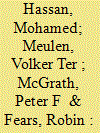

|
|
|
|
|
| Summary/Abstract |
Academies of science are typically independent organizations that commit to the role of advancing science and evidence in policy making. By definition, they are merit based, with members selected from among the leading scientific minds within a country or region. As such, they are viewed at home and abroad as places where scientific excellence across disciplines is represented.
|
|
|
|
|
|
|
|
|
|
|
|
|
|
|
|
| 2 |
ID:
071517
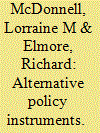

|
|
|
|
|
| Publication |
Santa Monica, Rand Corporation, 1987.
|
| Description |
ix, 33p.
|
|
|
|
|
|
|
|
|
|
|
|
Copies: C:1/I:0,R:0,Q:0
Circulation
| Accession# | Call# | Current Location | Status | Policy | Location |
| 029128 | 320.6/MCD 029128 | Main | On Shelf | General | |
|
|
|
|
| 3 |
ID:
139239
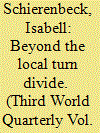

|
|
|
|
|
| Summary/Abstract |
This article builds on the contributions to this special issue by examining different approaches to the local turn and what can be learnt from applying them. The contributors agree on the imperative of understanding ‘the local’ in peacebuilding; however, there seems to be a multitude of ways forward in this regard. The immediate concern is how this acknowledgement translates into practices that allow for both efficiency and local emancipation in the building of peace. The article suggests giving up the ‘one-size-fits-all’ model of peacebuilding and engaging in context-based methods and research designs beyond generalisations. One way to go about this is to strive for interdisciplinary research – combining peace studies and political science with social anthropologists and area studies – but also to involve ‘the locals’ themselves in the process of taking a few methodological steps further.
|
|
|
|
|
|
|
|
|
|
|
|
|
|
|
|
| 4 |
ID:
138459
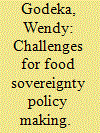

|
|
|
|
|
| Summary/Abstract |
Food sovereignty policy initiatives face significant challenges in their quest to be approved. This article examines the case of Nicaragua’s Law 693, the Law of Food and Nutritional Sovereignty and Security, which was passed in 2009. Drawing on empirical research, the article details the initial stages of the policy-making process – from the origins and development of the proposal for a food sovereignty law to its introduction and initial deliberation by the National Assembly to the breakdown in the approval process because of conflict over the law’s content. Using theoretical insights from the food sovereignty and food security policy literature, Law 693 is examined, noting key limitations food sovereignty faced during the policy-making process. The study finds that the strength and force of national food sovereignty discourses, the ability of food sovereignty advocates to convince others of the legitimacy and viability of the food sovereignty approach, and the willingness of the state to create the necessary conditions to foster food sovereignty are all important factors when evaluating the potential for food sovereignty to be successfully adopted into public policies.
|
|
|
|
|
|
|
|
|
|
|
|
|
|
|
|
| 5 |
ID:
177689
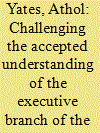

|
|
|
|
|
| Summary/Abstract |
The accepted understanding of what constitutes executive government in the United Arab Emirates (UAE) is that power rests with the Cabinet. This is, however, only partially correct. In reality, executive power over national security is excised from the Cabinet, and instead rests with a group of legislatively-defined agencies and posts. In other words, institutionally the UAE’s executive branch is bifurcated, with one part handling ‘high’ policy, meaning national security, and the other ‘low’ policy, that is all the rest. This article describes the unobserved part of the UAE’s executive branch. In doing so, it provides a significant advance in the understanding of the somewhat opaque nature of government in the UAE. Importantly, it provides a more nuanced understanding of the sources of power as they relate to the powerful Sheikh Mohammed bin Zayed Al Nahyan, a person often (mis)characterised as the de facto leader of the UAE.
|
|
|
|
|
|
|
|
|
|
|
|
|
|
|
|
| 6 |
ID:
151234
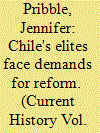

|
|
|
|
|
| Summary/Abstract |
The challenge for Chile is to ensure that policy making and governance are democratized further.
|
|
|
|
|
|
|
|
|
|
|
|
|
|
|
|
| 7 |
ID:
127299
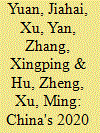

|
|
|
|
|
| Publication |
2014.
|
| Summary/Abstract |
China has proposed its 2020 clean energy target together with the climate change target of reducing CO2 intensity of the economy by 40-45% below the 2005 level. This article investigates the feasibility of these targets by testing their consistency under possible economic development scenarios. We analyse these targets from two perspectives: consistency with the overall economic growth and consistency with the international society's expectation on China's greenhouse gas (GHG) abatement responsibilities. The main findings are: under the recently announced 2020 target of gross domestic product (GDP) that is double the 2010 level, the adoption of a 15% clean energy target could result in excessive primary energy demand; and then with 40-45% GDP CO2 intensity reduction, CO2 emissions in 2020 could substantially exceed the International Energy Agency (IEA) 450 ppm scenario for China. Thus we propose a 17% clean energy target that can reconcile the domestic plan with international expectation. Our article also outlines the pathways to realise clean energy development into 2020 and proposes policy recommendations.
|
|
|
|
|
|
|
|
|
|
|
|
|
|
|
|
| 8 |
ID:
082054
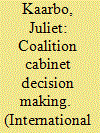

|
|
|
|
|
| Publication |
2008.
|
| Summary/Abstract |
This essay reviews the intersection between institutional and psychological conditions that occurs in multiparty coalition cabinets and the effects on foreign policy and decision making. Parallel research in social psychology and foreign policy can provide clues to the underlying mechanisms linking institutional context to policymaking and policy choices. The psychological processes involved in group polarization, persuasion, and other influence strategies as well as psychological factors affecting the quality of decision making are important in coalition cabinets and are reinforced by the particular institutional dynamics of multiparty governance. Indeed, this essay proposes that future research focus on contingency factors in the policymaking process, given the competing views on the effects of multiple advocacy on the quality of decision making and on the types of foreign policies associated with multiparty cabinets. More broadly, this essay supports the view that a highly structural understanding of the effects of institutions on politics and policies is incomplete and that research on the interplay among structures and human agents is critical.
|
|
|
|
|
|
|
|
|
|
|
|
|
|
|
|
| 9 |
ID:
130445
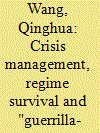

|
|
|
|
|
| Publication |
2014.
|
| Summary/Abstract |
Based on newly available memoirs and previously unexplored policy speeches by insiders, this article conducts a political analysis of the Chinese Communist Party's decision to radically expand college enrollment in June 1999. I argue that the decision exemplifies a "guerrilla-style approach" to policy-making. From late March to early June of 1999 when the radical expansion policy was formulated and legitimated, the top leadership ignored opposition from the Ministry of Education (MOE), overturned established policies and assumed de facto control over MOE bureaucratic power. This abrupt, forceful, disruptive and non-professional policy intervention, which aimed to ensure regime survival in the wake of the Asian financial crisis, was antithetical to regularized educational policy-making in post-Mao China.
|
|
|
|
|
|
|
|
|
|
|
|
|
|
|
|
| 10 |
ID:
126717
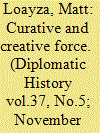

|
|
|
|
|
| Publication |
2013.
|
| Summary/Abstract |
This work examines the role of the State Department's Leader and Specialist programs in realizing the Eisenhower administration's (1953-1961) inter-American policies. Touted publically as a means of enhancing international goodwill, these two state-sponsored exchanges sought to cultivate more favorable views of the United States among foreign publics. The Leader programs invited foreigners to the United States for short-term visits, whereas the Specialist program financed extended travel for both foreign professionals going to the United States, and to Americans traveling overseas. In Argentina, Brazil, and Chile, U.S. officials emphasized the importance of persuading Latin Americans to reject economic nationalism in favor of free enterprise. Although U.S. officials attempted to direct the experiences of participants to maximize the likelihood of positive results, the programs failed to curb economic nationalism in the Americas. Nevertheless, these programs reflect the extent to which ideology and nationalism informed the policy making of U.S. officials during the early Cold War.
|
|
|
|
|
|
|
|
|
|
|
|
|
|
|
|
| 11 |
ID:
047069
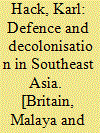

|
|
|
|
|
| Publication |
Richmond, Curzon Press, 2001.
|
| Description |
xiv, 341p.
|
| Standard Number |
0700713034
|
|
|
|
|
|
|
|
|
|
|
|
Copies: C:1/I:0,R:0,Q:0
Circulation
| Accession# | Call# | Current Location | Status | Policy | Location |
| 044418 | 325.359/HAC 044418 | Main | On Shelf | General | |
|
|
|
|
| 12 |
ID:
032125
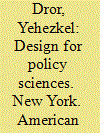

|
|
|
|
|
| Publication |
New York, American Elseviar, 1971.
|
| Description |
156p.
|
| Series |
Policy sciences book series
|
|
|
|
|
|
|
|
|
|
|
|
Copies: C:1/I:0,R:0,Q:0
Circulation
| Accession# | Call# | Current Location | Status | Policy | Location |
| 008778 | 320.6/DRO 008778 | Main | On Shelf | General | |
|
|
|
|
| 13 |
ID:
125687
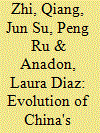

|
|
|
|
|
| Publication |
2013.
|
| Summary/Abstract |
Since 1978, when China launched its "opening up" reform, a range of large-scale national science and technology programs have been implemented to spur economic development. Energy has received significant attention and has become a growing priority in the past years. In this paper we have analyzed the goals, management, and impact over time of China's three largest national programs: Gong Guan, 863, and 973 Programs. Using quantitative metrics to describe the input and output, by conducting semi-structured interviews with officials, scientists, and other decision makers, and by reviewing available documents as well as a case study on the coal sector we examined the changes in the decision making process, particularly in regard to the role of scientists. We found that the changes in strategic priorities set by China's high level political leaders were implemented and then transformed into outputs by using scientists as inputs or policy tools. The decreased role of scientists has been driven by two forces: (1) periodic changes in national strategy emphasizing technology commercialization; and (2) changes in the management structure involving low tolerance of risk. We suggest four ways that the government's efforts to turn China into an innovation oriented country.
|
|
|
|
|
|
|
|
|
|
|
|
|
|
|
|
| 14 |
ID:
127791
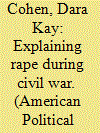

|
|
|
|
|
| Publication |
2014.
|
| Summary/Abstract |
Why do some armed groups commit massive wartime rape, whereas others never do? Using an original dataset, I describe the substantial variation in rape by armed actors during recent civil wars and test a series of competing causal explanations. I find evidence that the recruitment mechanism is associated with the occurrence of wartime rape. Specifically, the findings support an argument about wartime rape as a method of socialization, in which armed groups that recruit by force-through abduction or pressganging-use rape to create unit cohesion. State weakness and insurgent contraband funding are also associated with increased wartime rape by rebel groups. I examine observable implications of the argument in a brief case study of the Sierra Leone civil war. The results challenge common explanations for wartime rape, with important implications for scholars and policy makers.
|
|
|
|
|
|
|
|
|
|
|
|
|
|
|
|
| 15 |
ID:
155945
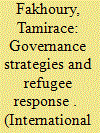

|
|
|
|
|
| Summary/Abstract |
This article discusses how the Lebanese state has responded to displacement from Syria (2011–17), and how the resulting policy formulation processes and discourses have constructed the relationship between the hosting state and the refugee. It focuses especially on how this small state has negotiated its politics of reception and choice of policy tools amid dysfunctional institutions and political disputes. To this end, it uses the lens of Lebanon's model of sectarian power sharing to understand the polity's response to mass displacement. This process has been structured by the defining dynamics of the country's politics of sectarianism: slack governance, an elite fractured model, and a politics of dependence on external and domestic nonstate actors. The Lebanese model offers broader insights into types of coping mechanisms that emerge in the context of forced migration, notably when a formal refugee regime is absent. The article contends that states lacking a legal asylum framework and grappling with various governance hurdles are likely to draw on the repertoire of their political regime to deal with displacement.
|
|
|
|
|
|
|
|
|
|
|
|
|
|
|
|
| 16 |
ID:
134336
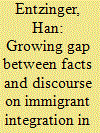

|
|
|
|
|
| Summary/Abstract |
The Netherlands’ recent history of dealing with immigrant integration provides an excellent example of the dangers of thinking in terms of fixed ‘national’ integration models. When first confronted with large-scale immigration, the Netherlands embarked on a policy of multiculturalism. Its current approach is one of the most assimilationist in Western Europe: several in-between forms have also been tried out. This article describes the evolution of Dutch thinking and Dutch policy-making on immigrant integration over the past few decades, and it analyses why the country has switched so frequently from one model to another. The harsher approach of this moment can be explained neither by major shifts that might have occurred in public opinion, nor by the actual course of the immigrant integration process, which has been advancing steadily. The root causes of the growing gap between facts and discourse lie in popular anxiety provoked by profound changes in Dutch society.
|
|
|
|
|
|
|
|
|
|
|
|
|
|
|
|
| 17 |
ID:
059294
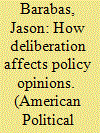

|
|
|
| 18 |
ID:
132942
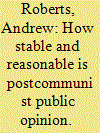

|
|
|
|
|
| Publication |
2014.
|
| Summary/Abstract |
The quality of democracy depends on both politicians and citizens. While most attention has focused on politicians, this paper looks at citizens. There has been some scepticism about whether the postcommunist public is prepared to rule their countries. The legacies of communism and the rigours of the transition may have produced citizens whose opinions are unstable and ill-informed and therefore a poor basis for democratic policy making. This paper tests this proposition by considering the nature of public opinion in the Czech Republic. Its main conclusion is that postcommunist public opinion is more reasonable than conventional wisdom suggests. Opinions on most policies change slowly if at all and when they do change the changes are prompted more by gradual shifts in mores than by political manipulation. This suggests that citizens in the region are prepared to have a significant voice in policy making.
|
|
|
|
|
|
|
|
|
|
|
|
|
|
|
|
| 19 |
ID:
088898
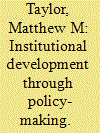

|
|
|
|
|
| Publication |
2009.
|
| Summary/Abstract |
A number of contemporary studies rightly emphasize the notion that policy outcomes result from institutional determinants. But as a growing literature on institutional development notes, these institutions are themselves impermanent. Sometimes, in crisis moments, institutions are replaced wholesale. More frequently, institutions evolve gradually over time. using the Brazilian Central Bank as a case study, this article illustrates that the policy-making process itself can be a central driver of gradual institutional development, with institutions evolving through the accumulation of policy choices made over many years and under different policymakers in response to contemporaneous events and unforeseeable economic and political challenges.
|
|
|
|
|
|
|
|
|
|
|
|
|
|
|
|
| 20 |
ID:
121081
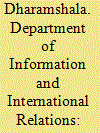

|
|
|
|
|
| Publication |
Dharamshala, DIIR, 2010.
|
| Description |
iii, 23p.Pbk
|
|
|
|
|
|
|
|
|
|
|
|
Copies: C:2/I:0,R:0,Q:0
Circulation
| Accession# | Call# | Current Location | Status | Policy | Location |
| 057337 | 320.609515/DHA 057337 | Main | On Shelf | General | |
| 057340 | 320.609515/DHA 057340 | Main | On Shelf | General | |
|
|
|
|
|
|
|
|
|